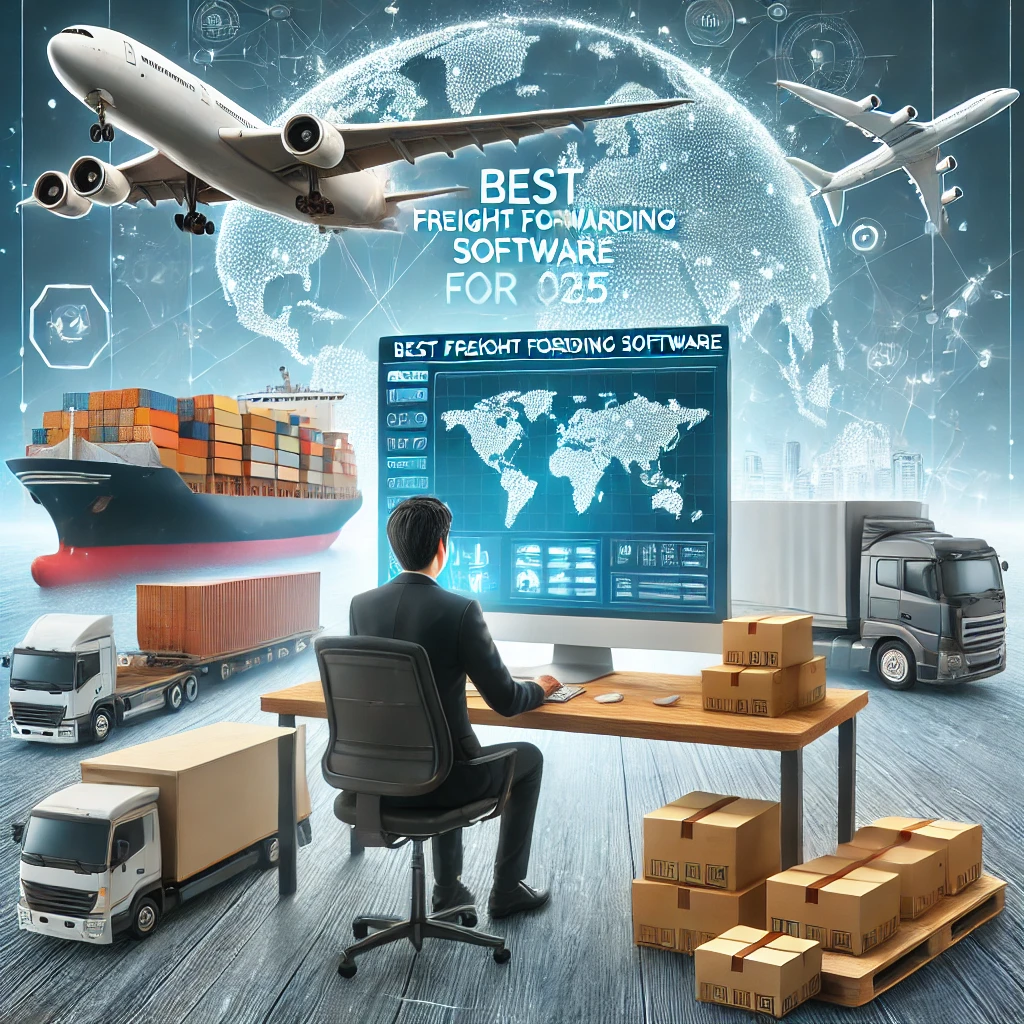Best Freight Forwarding Software for 2025

What is Freight Forwarding Software?
Freight forwarding software is a digital tool that helps logistics companies manage the complexities of international and domestic shipping. These platforms streamline tasks such as shipment tracking, documentation, customs clearance, invoicing, and communication with clients and partners.
Key features of freight forwarding software include:
- Automated Booking and Quoting
- Real-Time Shipment Tracking
- Document Management
- Customs Compliance
- Financial Reporting and Invoicing
- Customer Communication Portals
With the right freight forwarding software, companies can reduce manual work, improve accuracy, and provide better service to their clients.

Top Freight Forwarding Software for 2025
Here are the best freight forwarding software solutions to consider in 2025:
1. Linbis
Overview: Linbis is a cloud-based freight forwarding software designed for small to medium-sized businesses. It offers an all-in-one solution that covers everything from shipment management to invoicing and customs compliance.
Key Features:
- Multi-language support
- Automated quoting and booking
- Real-time shipment tracking
- Integration with accounting software like QuickBooks
- Customizable reports and dashboards
Why It Stands Out: Linbis is known for its user-friendly interface and affordability, making it a great choice for growing freight forwarding companies.
Pricing: Custom pricing based on business needs.
2. CargoWise
Overview: CargoWise is a leading freight forwarding software solution used by large logistics companies around the world. It offers a comprehensive set of tools for managing complex supply chains.
Key Features:
- End-to-end shipment visibility
- Customs compliance tools
- Warehouse and transport management
- Automated documentation
- Financial management tools
Why It Stands Out: CargoWise is highly scalable and offers extensive customization options, making it suitable for large enterprises.
Pricing: Contact sales for a custom quote.
3. FreightPOP
Overview: FreightPOP is a cloud-based transportation management system (TMS) that caters to freight forwarders, shippers, and 3PLs. It provides robust tools for managing both domestic and international shipping.
Key Features:
- Multi-carrier shipping
- Real-time rate comparisons
- Automated shipment tracking
- Mobile app for on-the-go access
- Advanced reporting and analytics
Why It Stands Out: FreightPOP integrates with over 300 platforms, including ERPs, CRMs, and accounting software, making it highly versatile.
Pricing: Starts at $199 per month.
4. Magaya Supply Chain
Overview: Magaya Supply Chain offers a suite of logistics and supply chain management tools, including freight forwarding, warehousing, and customs compliance solutions.
Key Features:
- Automated customs compliance
- Shipment tracking and visibility
- Integrated accounting and billing
- Mobile app for warehouse management
- Customer self-service portal
Why It Stands Out: Magaya’s focus on automation helps reduce manual work and improve operational efficiency.
Pricing: Custom pricing based on the size and needs of the business.
5. GoFreight
Overview: GoFreight is a cloud-based freight forwarding software that caters to both small businesses and large enterprises. It offers a user-friendly interface and comprehensive features for managing shipments, documents, and finances.
Key Features:
- Drag-and-drop interface for shipment management
- Automated document generation
- Real-time tracking
- Financial reporting and invoicing
- Customs compliance tools
Why It Stands Out: GoFreight’s ease of use and robust customer support make it a popular choice among freight forwarders.
Pricing: Contact sales for a custom quote.
6. Descartes
Overview: Descartes offers a wide range of logistics solutions, including freight forwarding software. It provides tools for shipment management, customs compliance, and warehouse management.
Key Features:
- Real-time shipment visibility
- Automated customs clearance
- Route optimization
- Mobile app for drivers
- Advanced analytics
Why It Stands Out: Descartes is known for its powerful analytics and reporting tools, which help businesses make data-driven decisions.
Pricing: Custom pricing based on business needs.

Key Features to Look for in Freight Forwarding Software
When choosing the best freight forwarding software for your business, consider the following features:
- User-Friendly Interface: Look for a platform that’s easy to navigate and doesn’t require extensive training.
- Automation: Choose software that automates repetitive tasks like booking, quoting, and documentation.
- Integration: Ensure the software integrates with your existing tools, such as accounting software, CRMs, and ERPs.
- Real-Time Tracking: Real-time visibility into shipments is crucial for improving customer service.
- Customizable Reports: The ability to generate custom reports can help you analyze performance and identify areas for improvement.

Benefits of Using Freight Forwarding Software
- Improved Efficiency: Automates manual tasks, reducing the time spent on administrative work.
- Cost Reduction: Helps optimize shipping routes and manage costs more effectively.
- Enhanced Customer Experience: Real-time tracking and automated communication improve transparency and customer satisfaction.
- Compliance and Documentation: Simplifies customs clearance and ensures compliance with international regulations.
- Scalability: Allows businesses to grow without being limited by outdated processes.
Trends Shaping Freight Forwarding Software in 2025
- AI and Machine Learning: More software solutions are incorporating AI to predict delays, optimize routes, and automate decision-making.
- Blockchain Technology: Enhances security and transparency in the supply chain by providing an immutable record of transactions.
- Mobile Accessibility: Mobile apps are becoming more common, allowing users to manage shipments and track deliveries on the go.
- Sustainability: Many software providers are focusing on tools that help reduce carbon emissions and improve sustainability in logistics.
Conclusion
Choosing the right freight forwarding software is essential for improving efficiency, reducing costs, and enhancing customer satisfaction. In 2025, platforms like Linbis, CargoWise, and FreightPOP are leading the way with innovative features and robust integrations. When selecting a solution, consider your business’s specific needs, budget, and scalability requirements to ensure you get the most out of your investment.
